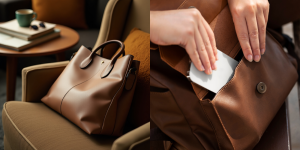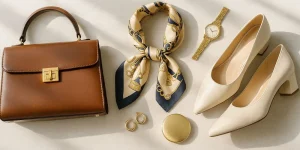Here’s the thing, the dining table is the center of attention. Whatever you place on it, is going to set the tone for the house. It is going to emote the vibe and aesthetics of the residents. So, one should choose to style it carefully.
Some of my favorite dinners have happened around a table with nothing more than a few candlesticks and a set of plates. There’s a quiet magic to candlelight. It softens the look of the room. Candlesticks are the new mood-makers; they instantly turn a dull night meal into a candlelight special dinner.
In this guide, we’ll skip the Pinterest-perfect pressure. Instead, you’ll learn how to create a centerpiece that feels like your home.
Why Candlesticks Belong on Your Dining Table
Candlesticks are a design shortcut. For centuries, they’ve anchored tables in ways that flowers, fruit bowls, or sculptural centerpieces can’t. If you are into old-money aesthetic and vintage decor, candlesticks are the perfect candidates as dining table centerpieces.
Let’s understand why.
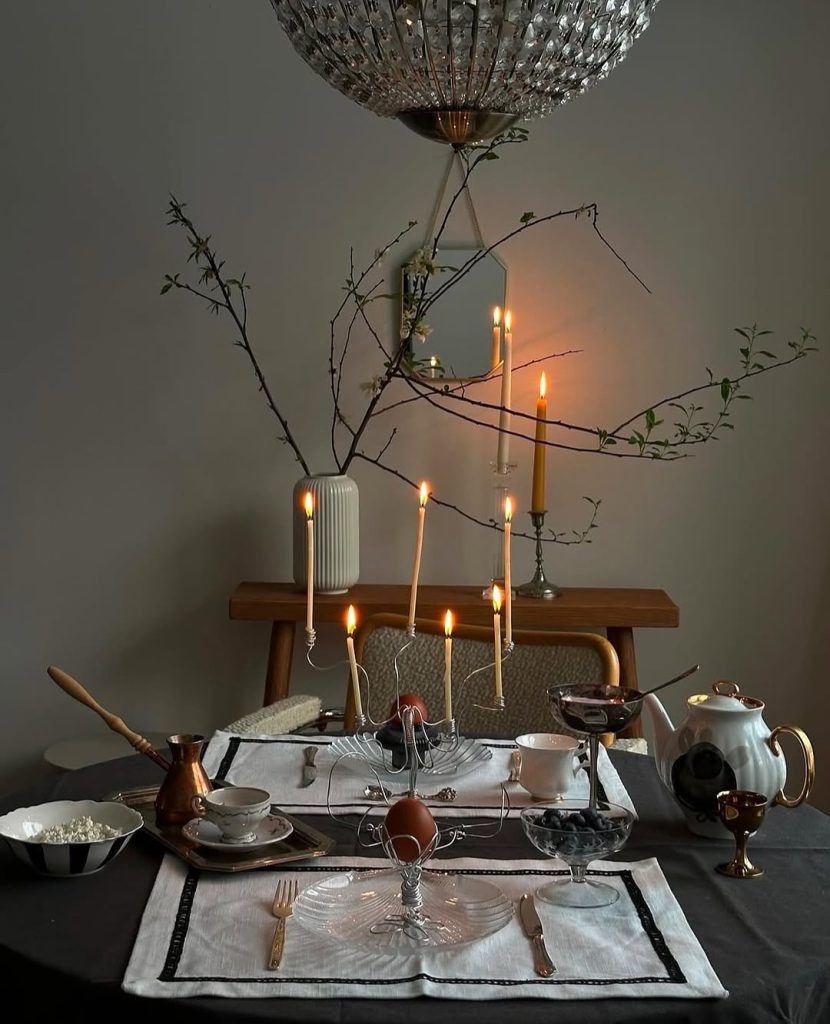
They Work in Any Era
Candlesticks have survived every trend cycle because they’re chameleons. In Victorian dining rooms, they stood beside silver tureens. In mid-century modern homes, they paired with sleek ceramics.
Today, they’re as likely to appear in every single apartment. Only because of their adaptability. From brass to wood we have come a long way.
Light You Can Control
Unlike fixed lighting, candlesticks let you dial ambiance up or down. For a bright brunch, skip the candles. Hosting a moody dinner? Light the tapers. Studies show dim, flickering light (like candle flames) lowers stress and boosts connection. Something overhead LEDs just can’t replicate.
No Seasonal Expiration
Pumpkins wilt. Poinsettias shed. But candlesticks are year-round players. Without having to change your dining table setting every season, you can simply place a candlestick on the table.
In spring, pair them with budding branches. In winter, add pinecones. In July, leave them bare beside a bowl of lemons. They’re the evergreen buy once, style forever piece.
Practical Perks
Candlesticks are not only aesthetically pleasing but they do have some practical benefits. They are less space-consuming. Unlike sprawling floral arrangements, candlesticks add height without hogging the table. For those having kids, (you know the havoc they cause in decorated homes), a sturdy brass candlestick will survive sticky fingers and breakage easily.
Step 1: Choosing the Right Candlesticks
Step 1 of styling candle sticks on the table, comes with the obvious choice. The right candle stick. But how do you decide? Go over the following checklist:
1. Measure First, Shop Later
Long tables: Use pairs. For a 6-foot table, two sets of candlesticks (placed 1/3 and 2/3 down the table) to keep the look balanced.
Round tables: Cluster 3 candlesticks in the center at varying heights (e.g., 6”, 8”, 12”). Or simply choose one i.e., 12”.
Small spaces: Opt for slim, vertical designs that don’t clutter the table.
HMM Tip: Tape newspaper cutouts to your table to visualize spacing before buying.
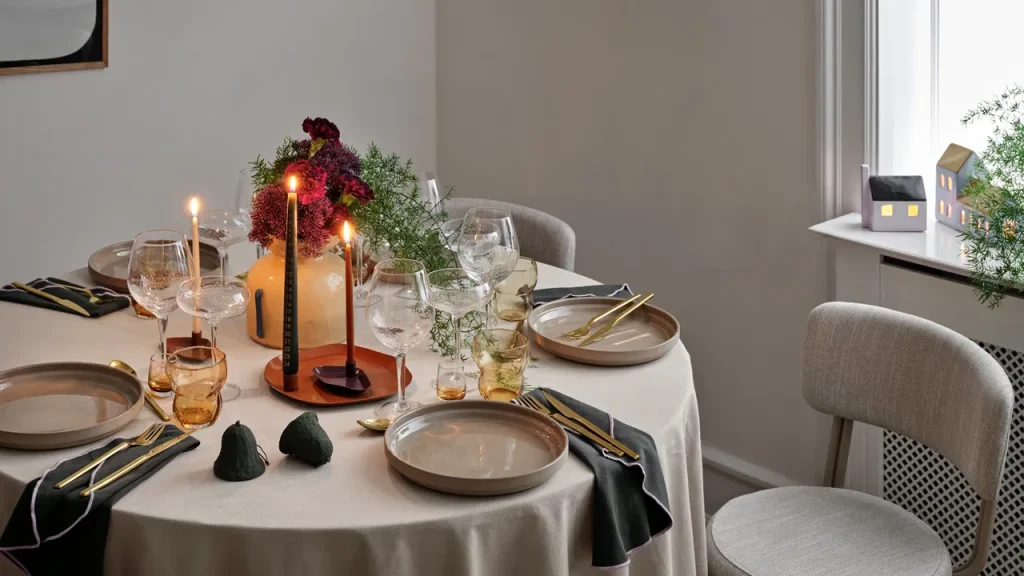
2. Match (or Contrast) Your Table’s Personality
Rustic tables (wood, farmhouse style): Try gold or weathered brass.
Modern tables (glass, marble): Sleek ceramic or crystal geometric metal sticks.
Formal tables (linen, china): Polished silver or crystal for light reflection.

3. Get the Height Right
Candlesticks should not in any way block the table. Choose the right height according to this guide:
Tall tapers (12”+): Reserve for sideboards or buffets. On the table, flames should sit below eye level when seated.
Mid-height (8–10”): Ideal for most tables. Let light glow without glare.
Short (4–6”): Perfect for casual settings or narrow tables.

Step 2: Arranging Candlesticks Like a Pro
You do not need a fancy florist or an expensive decor team to style candle sticks centerpiece dining table. Work with what you already own.
The Rule of Three
Odd numbers create harmony. Three candlesticks of different sizes add rhythm to the table.
For long tables or formal dinners, two pairs of candlesticks (placed symmetrically) work better.
Inspiration: Try 3 mismatched thrifted brass candlesticks + identical ivory tapers.

Symmetry vs. Asymmetry
Symmetrical:
Mirrored candlesticks at both ends of the table.
Ideal for: Weddings, holidays, or tables with fussy place settings.
Asymmetrical:
Cluster candlesticks to one side with trailing ivy or a stack of books.
Ideal for: Casual dinners, small tables, or eclectic decor.
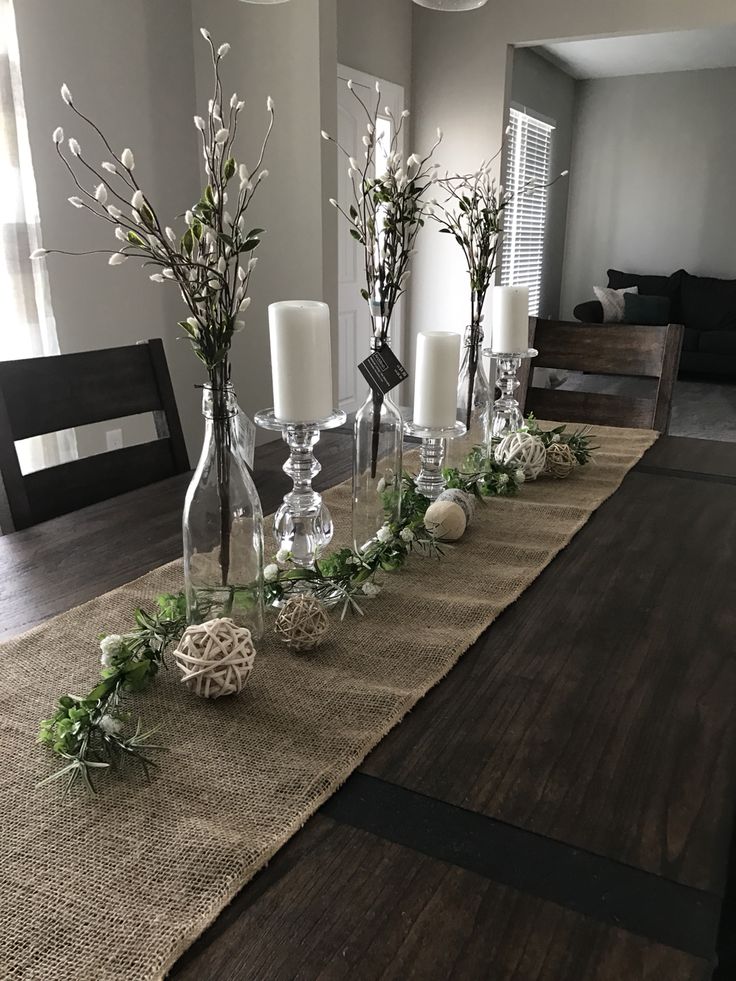
Layering 101: Depth Without Clutter
Base Layer:
Start with a textured runner (linen for basic, lace for aesthetic).
Mid-Layer:
Add candlesticks and low florals (e.g., hydrangeas in a squat vase).
Top Layer:
Sprinkle in small accents of dried citrus slices, loose pearls, or sprigs of rosemary.
Pro tip:
Leave at least 8 inches between the candlesticks and plate settings.
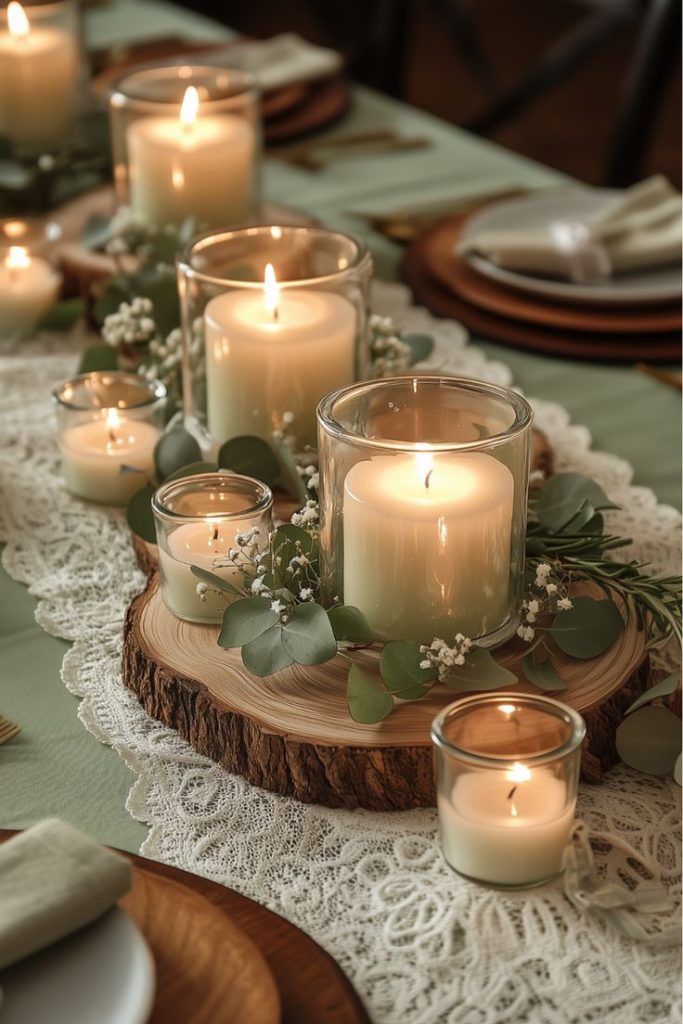
Step 3: Pairing Candlesticks with Complementary Decor
Candlesticks go well with these items (if you style them right):
With Florals
Pair tall candlesticks with low, wide blooms (peonies, dahlias). Don’t go overboard with flowers. If candlesticks are ornate, keep florals simple. You can also pick up a candle tray holder if you love minimal style with a small vase beside it.
Use grocery-store carnations. These are more budget-friendly.

With Fruit
A bowl of lemons, figs, or apples adds color and freshness. For farmhouse vibes, pair with wood candlesticks. Don’t use overly juicy fruits (berries, peaches) unless you love sticky wax.
To create texture, use a ceramic or wooden bowl to place fruits in it. Make sure the color of bowl goes with the color scheme of the whole dining area.

With Textiles
Linen napkins:
Pair with matte black or wood candlesticks.
Velvet runners:
Go glam with polished silver or crystal. Lace also adds a quiet luxury touch.
Burlap:
Keep it rustic with iron candlesticks and wildflowers.
Golden rule:
Match the candlestick material to the formality of your textiles. Linen + brass = casual elegance. Silk + crystal = black-tie ready.

Step 4: Lighting and Safety Tips
Follow these lighting and safety tips for extra precaution.
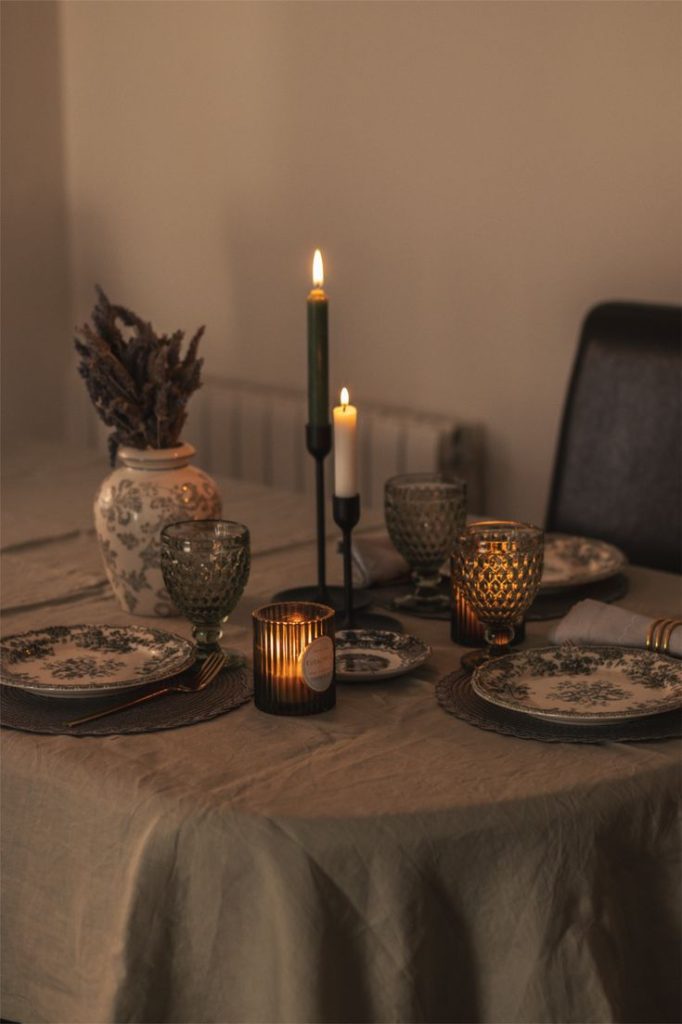
Candle Choices
The type of candle you choose is pretty important.
Scented/Unscented tapers: Food smells > perfume (personally). Try beeswax for a subtle honeyed glow.
Drip-free: Essential for formal events. Look for “slow burn” on labels.
LED alternatives: Flameless candles with realistic flickers are in too. Choose those if you are avoiding real candles.
Safety Checks
Decor shouldn’t cost you your safety. It’s good to take extra steps.
12-inch rule: Keep flames 12+ inches from curtains, florals, or paper decor.
Kid/pet hack: Swap tapers for pillar candles when kids are around. They’re harder to knock over.
Trim wicks: ¼ inch prevents smoking. Use nail clippers in a pinch.
The “Blow Out” Test
Before guests arrive: Light the candles. If they smoke, sputter, or smell like chemicals, swap them.


